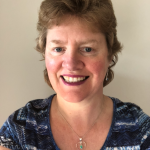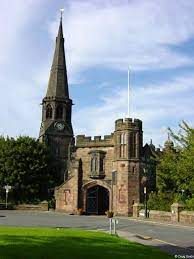
St Wilfrids Standish Lancashire
Henry Finch was born in 1633 in Standish, Lancashire, England to parents Peter Finch (1601-1664) and Katherine Prescot (1599-1670).
Henry was baptised on 8 September 1633 at St Wilfrids, in Standish. The parish baptism register is in latin.
Henry was educated at the grammar schools of Standish and Wigan, and entered the Anglican priesthood.
After preaching in the Fylde country (between the Lune and the Ribble) he was presented in 1656 to the vicarage of Walton-on-the-Hill, Lancashire, a parish which then included the town of Liverpool. He was a member of the fifth Presbyterian classis of Lancashire.
In July 1659 he took an active part in the plans for the rising of the ‘new royalists’ under Sir George Booth. His property was seized by the parliamentary sequestrations, and not restored. Unable then to accept the terms of the Uniformity Act 1662, he was ejected.
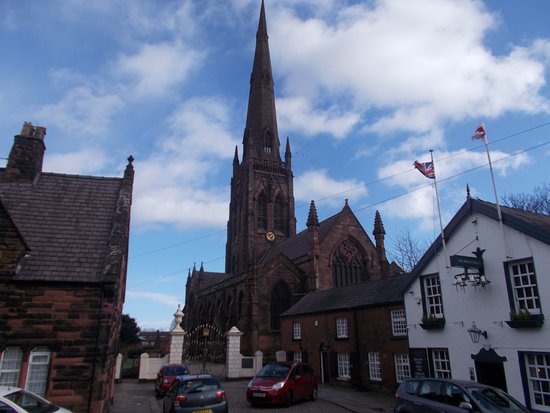
St Elphins Warrington
Henry Finch married the widowed Mary Hammond, nee Brooke, on 11 October 1659 at St Elphins, Warrington, Lancashire.
Mary Brooke was born in Stockport, Cheshire and baptised there on 10 March 1636, the daughter of Nicholas Brooke 1610-1637 and Margaret Peake. She was the widow of William Hammond, whom she had married at Warrington on 24 June 1653.
Mary and William Hammond had three children – William in 1654, Nicholas 1656-1662 and Thomas in 1658. Her husband William died in 1658.
This is confirmed by the PCC will of William Hammond of Little Sankey near Warrington in 1658. The beneficiaries of his estate were his wife Mary and his 3 sons William, Nicholas and Thomas. His grandfather, Thurston Peake, and his uncles James Peake and Thomas Peake and his brother Thomas Hamond were named as executors and overseers.
Almost exactly nine months after Mary married Henry Finch, their first child was born. The couple had eight children together –
- Mary Finch b 1660 Walton on the Hill, Lancashire
- Tabitha Finch b 1662 Walton, d 1671 Manchester, Lancashire
- Peter Finch, Rev b 1663 Walton, d 1754 Norwich, marr Elizabeth Mackrell, 8 kids
- John Finch b 1665 Warrington d 1735 Croston, Lanc, marr Esther Cash
- Nathan b 1666 Manchester
- Hannah Finch b 1668 Manchester, marr James Grimshaw
- Elizabeth b 1669 Manchester
- James b 1671 d 1673 Manchester
Both at Warrington and Manchester Rev Henry Finch attended the ordinary services of the Church of England, preaching only occasionally on Sunday evenings in his own dwelling to such restricted gatherings as the law allowed.
Henry retired to Warrington, where he lived for some years in dependence on his wife’s relatives. The Five Mile Act (1665) compelled him to leave, and he settled in Manchester (not then a corporate town), where he supported himself by keeping a school.
In 1672 King Charles promulgated the Declaration of Indulgence, which suspended the penal code against all religious Nonconformists, Catholic and Dissenter alike. But a declaration of toleration could not bring together these mortal enemies, and the king found himself faced by a unified Protestant front. Parliamentary Anglicans would not vote money for war until the declaration was abrogated. The passage of the Test Act (1673), which the king reluctantly signed, effectively barred all but Anglicans from holding national office and forced the duke of York to resign the admiralty.
In the Indulgence of 1672, Rev Henry Finch took out a licence as a ‘general Presbyterian minister,’ and officiated in the licensed ‘private oratory’ (Birch Chapel), which was in the hands of Thomas Birch of Birch Hall, Rusholme, Lancashire, though the legal owners were the warden and fellows of the collegiate church of Manchester.
On 29 October 1672 he took part in the first ordination conducted by the ejected nonconformists, in the house of Robert Eaton at Deansgate, Manchester.
On the outbreak of the Monmouth rebellion (1685) Finch was imprisoned at Chester; but later was allowed to resume his ministry.
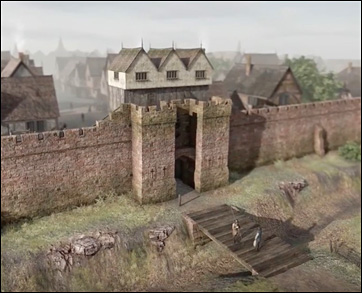
Chester Gaol
People could be confined in the Northgate Gaol in Chester for all manner of offences, some quite trivial such as rowdyism, non payment of debts- and even the baking of poor quality bread. The worst parts of the prison- the main entrance to which was on the west side of the gate were excavated from the bedrock up to 30 feet below the street. Descriptions written in the 17th century talk of them being “noisome, pestilential, stinking, and crowded with venomous creatures”.
The Toleration Act (1689) called attention to the insecurity of his position: Birch Chapel, being a consecrated place, could not be licensed as a dissenting meeting-house. Finch, however, stayed on until the death of Thomas Birch the younger in 1697, when the chapel was ceded by his son, George Birch, to the legal owners.
Henry appears in the ‘Record Book of Dissenting Meetings 1689-1852’, Lancaster Quarter Sessions, Manchester dated 25 July 1689 – Birch chapel and house of Henry Finch in Deansgate. Lancashire Record Office.
Finch then preached at licensed houses in Platt and Birch, till his friends built a meeting-house at Platt (1700), Finch himself contributing towards the erection. The opening discourse was preached by Finch’s son-in-law, James Grimshaw of Lancaster, author of ‘Rest from Rebels,’ 1716.
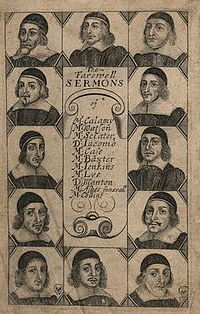
Title page of a collection of Farewell Sermons preached by Nonconformist ministers ejected from their parishes in 1662.
Finch was a member of the provincial meeting of united ministers (Presbyterian and congregational) formed in Lancashire in 1693 on the basis of the London ‘agreement’ of 1691, involving a doctrinal subscription.
He preached before this meeting on two occasions, 4 August 1696, and 13 August 1700, both at Manchester.
Edmund Calamy (see pic – first name on list) acknowledged Finch’s corrections to his account of the silenced ministers. A strong supporter of the Glorious Revolution of 1688, Finch was also a charitable contributor to nonjurors. (A nonjuror was a member of the clergy who refused to take the oath of allegiance to William and Mary in 1689).
Henry’s wife Mary Finch, nee Hammond, died in 1694 in Manchester. She was buried on 27 February 1694 at Manchester Cathedral.
Rev Henry Finch died on 13 November 1704, and was succeeded by Robert Hesketh, early in whose ministry the chapel was conveyed (25–6 October 1706) in trust for the maintenance of an ‘orthodox’ ministry.
Henry was buried on 16 November 1704 at St Mary, St Denys and St George in Manchester, Lancashire, otherwise known as Manchester Cathedral.
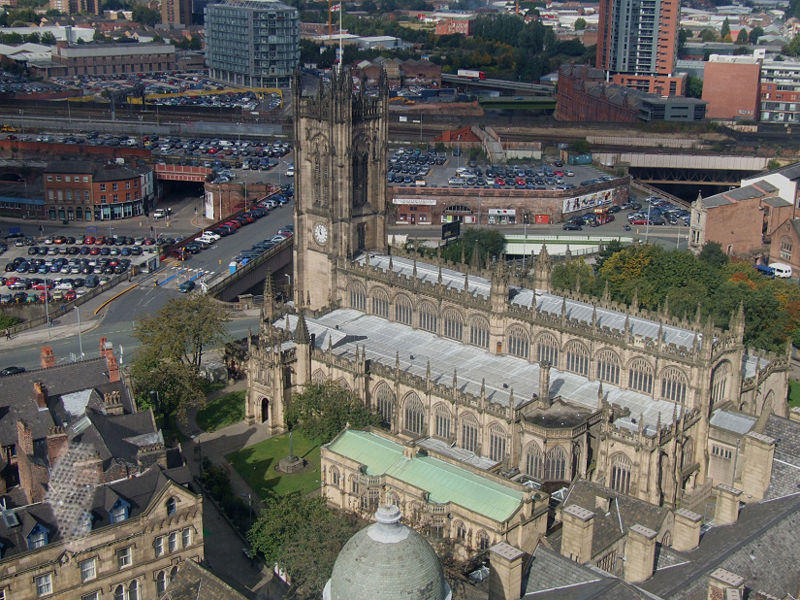
Manchester Cathedral
Rev Henry Finch’s descendant, Peter Finch Steward, was granted the Royal License to the bear the Finch Arms by proclamation from the Queen in 1861. Peter Finch Steward’s line of ascent is as follows –
Rev Henry Finch, Rev Peter Finch & Elizabeth Mackarell, John Finch & Sarah Finch, Peter Finch & Bridget Rolfe, Sarah Finch & John Tuthill, Lucy Tuthill & Timothy Steward, Peter Finch Steward.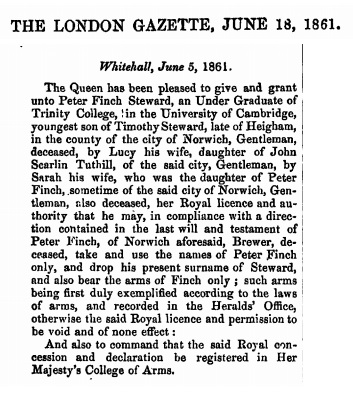
Additional sources Wikipedia – Henry Finch and Dictionary of National Biography – Finch, Henry

